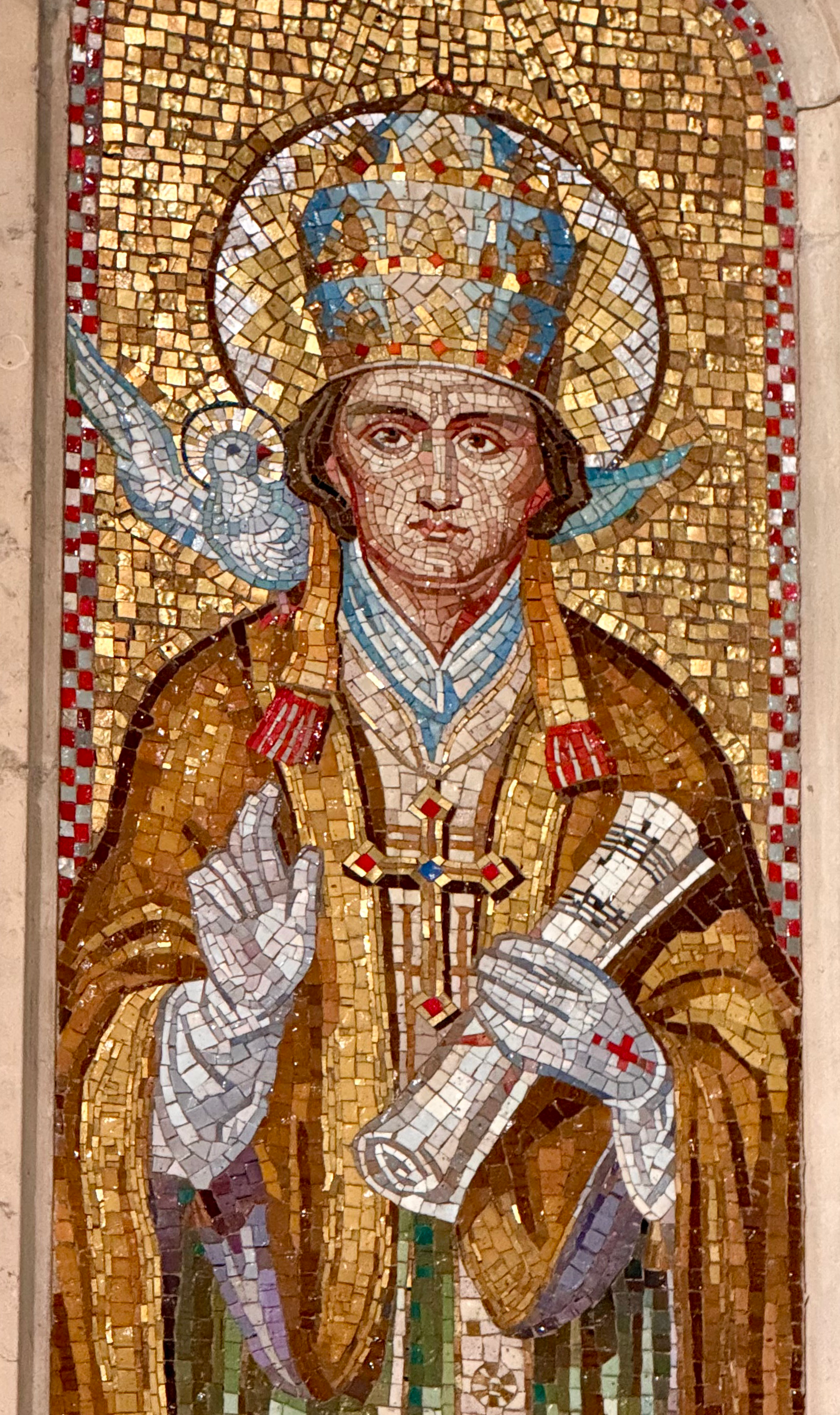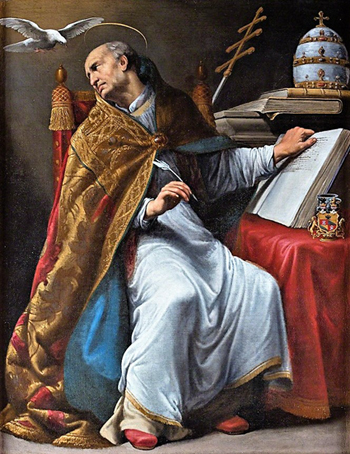Report on St. Gregory the Great
Introduction
St. Gregory the Great (c. 540–604 AD), also known as Pope Gregory I, was one of the most significant popes in the history of the Catholic Church. His papacy, which lasted from 590 to 604 AD, marked a period of profound transformation for both the Church and the Western world, especially during a time of political instability following the fall of the Roman Empire. Gregory is remembered for his contributions to the development of the papacy, Christian liturgy, monasticism, and missionary work. His influence extends beyond his papacy, leaving a lasting legacy in Church teachings, pastoral practices, and the shaping of medieval European civilization.
Early Life and Career
Gregory was born around 540 AD into a prominent Roman family. His father, Gordianus, was a senator, and his mother, Silvia, was a devout Christian. Raised in an aristocratic family, Gregory received an excellent education in rhetoric, law, and philosophy, which would later serve him well in his ecclesiastical career.
Gregory initially pursued a secular career in government. He became a civil official, serving as the prefect of Rome under Emperor Justinian I. Despite his success in public service, Gregory felt a growing spiritual calling and, in the mid-570s, he withdrew from his political career to enter a monastic life. He founded a monastery on his family estate in Rome, where he devoted himself to prayer, study, and asceticism. This period of monastic life deeply influenced his later work as pope.
Papacy and Leadership
In 590 AD, Gregory was unexpectedly elected as pope following the death of Pope Pelagius II. Initially reluctant to assume the papacy, Gregory accepted the position after being urged by both the clergy and the people of Rome. His election came at a time of great turmoil for the Church, with the collapse of the Western Roman Empire, the rise of barbarian kingdoms, and widespread famine and disease in Italy.
Gregory’s papacy was marked by a series of bold reforms and actions, many of which helped to stabilize the Church and provide spiritual guidance to a fragmented society. Key aspects of his leadership include:
1.Strengthening the Papacy: Gregory worked to enhance the authority and influence of the papacy, both within the Church and in broader political matters. He firmly asserted the supremacy of the pope over the entire Christian world, emphasizing the spiritual authority of the papacy in a time when the political authority of the Roman Empire had faded. Gregory’s emphasis on the pope as a shepherd of souls helped to establish the papacy as the central authority in Christianity.
2.Administrative Reforms: Gregory reorganized the Church’s administration to better respond to the needs of the faithful. He took a direct role in appointing bishops, organizing Church resources, and ensuring that the clergy were properly trained and disciplined. His efforts helped improve the Church’s ability to minister to people across the vast regions of the former Roman Empire.
3.Pastoral Care: Gregory was deeply concerned with the spiritual welfare of his flock. His many letters and writings reveal a pope who was actively involved in addressing issues of moral conduct, discipline, and Christian charity. He worked to provide a pastoral model of leadership, seeing himself as a servant of the people. His emphasis on the importance of humility, prayer, and charity helped shape the Church’s pastoral approach for centuries to come.
Liturgy and Music
St. Gregory’s contributions to Christian liturgy were groundbreaking. He sought to standardize and simplify the liturgical practices of the Church to create greater uniformity across regions, which was especially important as the Roman Empire had fragmented and communication between regions became more difficult.
1.Gregorian Chant: Gregory is often credited with the development and promotion of Gregorian chant, a form of plainchant used in the liturgical services of the Church. Although it is debated whether Gregory personally composed these chants, he is often associated with their codification and promotion. The chants he encouraged became a central part of the Roman Catholic liturgy and have remained a significant part of Christian worship throughout the centuries.
2.Liturgical Reforms: Gregory also reformed the Mass and other liturgical ceremonies, making them more accessible to the faithful. He promoted the use of Latin in the liturgy and sought to ensure that the liturgy was performed with reverence and simplicity, so that all could participate in the worship of God.
Missionary Work and Evangelism
Gregory the Great is also remembered for his missionary zeal. One of his most significant achievements was his role in the Christianization of the Anglo-Saxons in England. In 595 AD, he sent a mission to England, led by St. Augustine of Canterbury, to convert the pagan Anglo-Saxons to Christianity. This mission, often referred to as the Gregorian Mission, proved to be incredibly successful, leading to the widespread establishment of Christianity in England.
Gregory’s missionary efforts were not confined to England. He also sought to strengthen the faith in areas of Europe that had been recently Christianized, such as Germany and Spain. His emphasis on the importance of evangelizing and educating the faithful became a defining feature of the Church’s role in medieval Europe.
Theological Contributions
St. Gregory made significant theological contributions, particularly in his teachings on the nature of sin, salvation, and the role of the Church. Some of his most important theological writings include his Moralia in Job, a commentary on the Book of Job that combines biblical exegesis with spiritual instruction, and his Dialogues, which focused on the lives of Italian saints and the practice of monasticism.
Gregory is often associated with the development of the doctrine of purgatory. His writings on the afterlife emphasized the idea of purification after death, a concept that would later become central to Catholic theology. His teachings on the nature of sin and the importance of repentance and prayer also had a lasting influence on Christian thought.
Legacy and Canonization
St. Gregory the Great is remembered as one of the most important popes in the history of the Church. He was canonized as a saint shortly after his death, and his feast day is celebrated on September 3. In 1298, he was declared a Doctor of the Church by Pope Boniface VIII, in recognition of his theological and pastoral contributions.
Gregory’s legacy extends beyond his papacy. His reforms in the liturgy, his emphasis on monasticism, and his missionary work helped lay the foundation for the medieval Christian world. His efforts to standardize liturgical practices and his emphasis on the moral and spiritual leadership of the pope have had a lasting impact on the Catholic Church and its role in global Christianity.
Conclusion
St. Gregory the Great’s papacy and contributions to the Christian faith were transformative, and his influence continues to be felt in both the Church and the world today. His emphasis on pastoral care, missionary work, liturgical reform, and theological reflection helped shape the course of Christianity during a time of great political and social upheaval. As a pope, theologian, and missionary, Gregory’s leadership helped preserve and strengthen the Christian faith in the Western world, making him one of the most important figures in the history of the Catholic Church.






